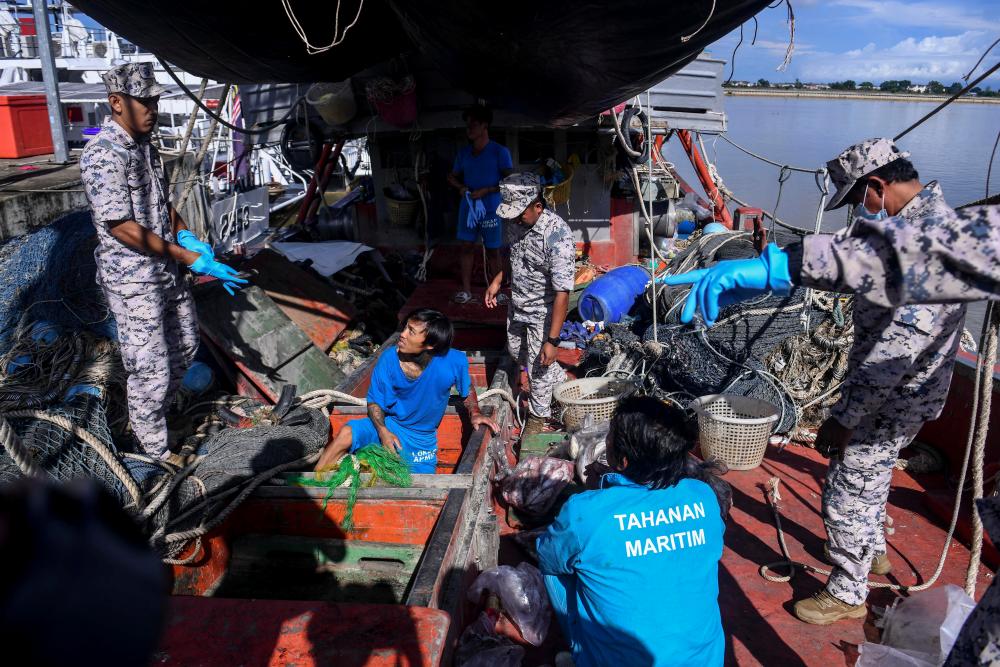PETALING JAYA: Rampant illegal fishing in Malaysian waters is costing the country losses of between RM3 billion and RM6 billion annually, says Fisheries Department (DOF) director Datuk Adnan Hussain.
“An average of 980 tonnes of seafood is illegally fished out of Malaysian waters each year, mainly due to fishing in restricted areas by foreigners. The figure of RM3 billion to RM6 billion (in losses) can be explained by the difference in the number of illegal fishermen, the size of the trawler boats they use and their catch.
“The amount of stolen fish directly affects our fishermen and is a major loss of our marine resources. We are working hard to put a stop to it,” he told theSun.
In efforts to overcome illegal fishing, Adnan said his department is now more focused on implementing the Monitoring, Control and Surveillance Programme (MCS) under the Fisheries Act 1985.
“MCS is an integral component of fisheries management, and involves monitoring and action against fishermen who fail to abide by local and national laws, sub-regional or regional conventions, licensing terms and conditions, and more.”
Adnan stressed the effects of overfishing caused in part by illegal fishing would lead to a decline in catch rates, which ultimately leads to reduced income for fishermen due to such unsustainable practices.
“Malaysia cooperates with neighbouring countries to manage fisheries resources. So, if a country is protecting its threatened and endangered species and spawning stock through a closed season on fishing, neighbouring countries should implement the same,” he said.
Adnan added that this would ensure the management and protection of fisheries resources, especially those shared with neighbouring countries, as it would have a major impact on the conservation of such resources.
“DOF is ready to implement all the management plans that have been drawn up to ensure that follow-up action is carried out accordingly.
“We have so far been successful as there has been a decrease in illegal fishing, by as much as 4% and an increase in value of up to 7% in 2021 compared with 2020.
“However, to be more successful, DOF needs financial support and sufficient personnel to develop a Fisheries Management Plan (FMP) and National Plan of Action (NPOA) that are effective.
“Hiring as many experts as possible and consulting fisheries stakeholders are among the processes in our strategic planning and research for national fisheries management to effectively implement the FMP and NPOA.”
Adnan also said one of the latest measures implemented by DOF is “Taman Laut”, which is a fish nursery in the sea that serves to replenish and rebalance marine resources.
“Artificial reefs have become the natural habitat for fish to reproduce and will also balance the fish population in Malaysian waters.
“Apart from that, the protection of mangrove forests must be maintained to ensure the natural habitat is guaranteed while implementing a closed season on shrimp harvesting in the East Coast is also a good way to ensure the resource is sustained.”
Adnan said local fishermen lacked awareness and understanding, especially regarding sustaining fisheries resources.
“The unwillingness to support conservation efforts of the country’s fisheries resources is one of the challenges we have to face.”
Meanwhile, National Fishermen’s Association chairman Abdul Hamid Bahari said despite strict enforcement measures in Indonesia, Malaysia and Thailand, illegal fishing remains rampant.
“Fishermen should be given a clear understanding of government policy, and be assisted with funding and the latest fishing technology to ensure they can maximise their boat capacity and catch.
“In enforcing the law, DOF cannot ignore the hardships facing fishermen, which are often caused by those fishing outside designated areas.
“DOF should conduct more operations in the country’s waters regardless of the set time and ensure that no illegal fishing is taking place. This will be of great help to Malaysian fishermen,” he added.














